
In a haunting predicament that sends shivers down our collective spine, an individual is ensnared in a maze of legal discrepancies and shadowy undertakings. He exclaims with desperation,
“I am NOT juliensweiss!!!“
“I am not running from justice; I am fleeing from injustice.”
1. **A Mysterious Request for Secrecy**:
At the outset, one wonders why the US government would request the Greek authorities to enshroud all documents in secrecy. What lies hidden beneath this demand?

The recurring pattern of sealed documents and restricted entries in his case raises serious concerns about transparency and his right to a fair trial. From the initial motion to seal to the numerous entries that are continually restricted or sealed, it’s challenging to grasp the full extent of the evidence and allegations against him. While there might be legitimate reasons for sealing certain documents, such as protecting sensitive information or witnesses, the excessive secrecy surrounding this case could arguably infringe upon his rights. What’s so sensitive in the case that multiple entries remain hidden from public scrutiny? The objective of a just system should be to ensure that all parties have equal access to information and a fair opportunity to present their case. The excessive secrecy casts a shadow of doubt on the judicial proceedings, and it begs the question: Is the goal to maintain justice or merely to cloak the trial’s intricacies?
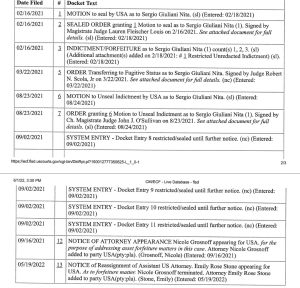


The veiled secrecy with which the U.S. approached this matter seems to have permeated beyond just official channels, casting a shadow over social media platforms, NGOs, and even the media at large.
It is peculiar that an event as significant as an Interpol red notice arrest at an EU airport, subsequent release on bail, the U.S. losing the initial extradition hearing against the Romanian citizen, a retrial in the Greek Supreme Court, a subsequent arrest just days before the supreme court’s judgment, and the final decision to extradite, followed by the individual becoming a fugitive, has seemingly evaded the media spotlight. For such a series of dramatic events to occur without garnering substantial media attention is indeed an anomaly. One can’t help but ponder the reasons behind this unusual silence in an era where information flows freely and rapidly.
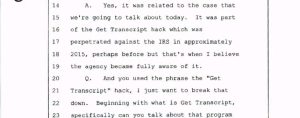
Within this already intricate narrative, it’s noteworthy to highlight that the individual in question is not only implicated in a series of procedural anomalies but also stands accused of hacking into the IRS – a monumental breach that supposedly resulted in the theft of $58 million. This cyber intrusion not only raised concerns about the security measures of one of the U.S.’s most critical agencies but also prompted a thorough investigation by the U.S. Senate. Despite the severity of these allegations and the heightened interest that a Senate investigation would generally attract, the media has been conspicuously quiet. This adds another layer of intrigue to an already perplexing situation.
Why would such a high-profile case, involving alleged hacking and a significant sum of money, not become a focal point for news outlets and investigative journalists?
The entire situation, riddled with inconsistencies and underpinned by an unexplained secrecy, raises more questions than it answers.

2. **Blatant Forgeries**:
IRS agent statements carry signatures that seem to have been mindlessly copy-pasted using a mouse. More shockingly, there are claims of judges’ signatures being artificially replicated to authenticate these statements.
Could this really be passed off as an electronic signature?
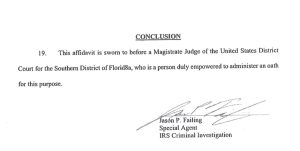
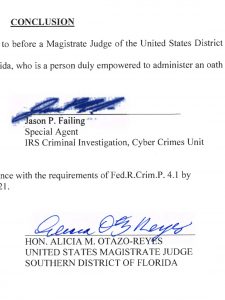
The discovery of two distinct original diplomatic notes, both bearing identical date and registration number but with different signatures and attributes, casts a shadow over the legitimacy of the extradition request. A Graphological Expertise Report by Mr. Athanasios Chr. Moulias, Lawyer – Judicial Notary, registered in the valid lists of experts, Member of the Panhellenic Union of Expert Judicial Scribes – Examiners of Writing and Documents, further attests to these discrepancies, underlining that one isn’t a mere photocopy of the other but an entirely separate original. This unusual and seemingly illogical occurrence, especially given the urgency of the extradition timeline stipulated in the bilateral treaty, calls into question the procedural accuracy and fairness of the entire process. There’s an immediate need to validate the authenticity of these documents and understand the implications of having multiple originals with the same content but different features in a legal setting.
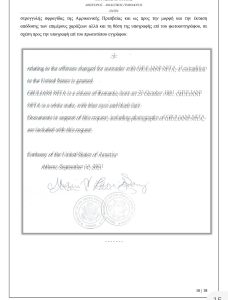
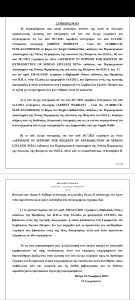
3. **Irregularities in the Warrant**:
The waters become murkier with the revelation of multiple irregularities in his arrest warrant. Not only is it unsigned by any judge, but the person whose name is printed on the warrant did not sign it.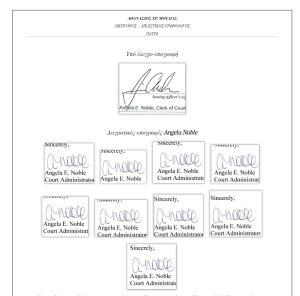
Furthermore, this crucial warrant was alarmingly issued by a non-judicial entity.
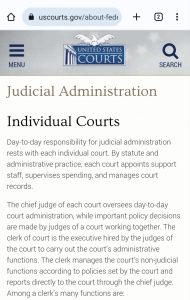
In the realm of the U.S. judicial system, the role of the clerk of the court is distinct and clear-cut. According to the administrative guidelines provided by the U.S. Courts official website (uscourts.gov), the clerk of the court is not a judicial authority. Instead, their responsibilities lie strictly within non-judicial functions. They are appointed to manage the administrative tasks of the court, as defined by the policies set forth by the court. Their management and oversight of these non-judicial tasks come under the direct supervision of the chief judge. Thus, any involvement or implication of the clerk in judicial decisions or actions would be contrary to the delineated responsibilities of their role.
It raises perplexing questions when a prosecutor, who in essence is an attorney representing the government, directs an arrest warrant to the Clerk of the Court, who, intriguingly, is also an attorney and NOT a Judge.


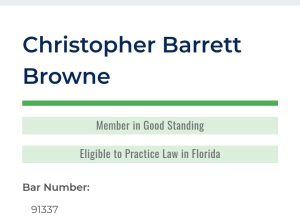

In the legal system, there’s a clear distinction between the roles of a judge or magistrate and that of an attorney. Judges and magistrates are entrusted with the duty of impartially interpreting and applying the law, while attorneys advocate for their clients within the bounds of that law. Due to this fundamental difference in responsibilities, a judge or magistrate is not eligible to practice law, ensuring the preservation of their impartiality and the integrity of the judicial process.
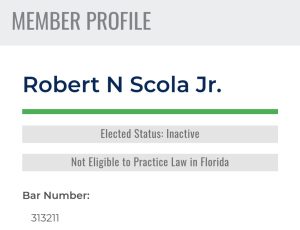
The traditional roles and boundaries within the judicial process appear to be blurred, prompting one to question the regularity and validity of such actions.

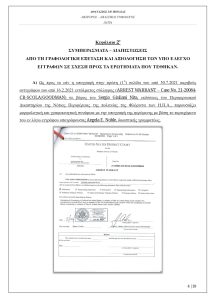
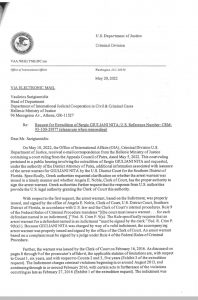
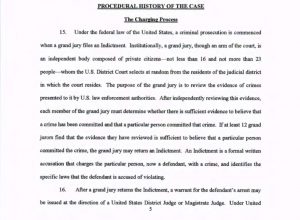
The inconsistencies in the system are bewildering. On one hand, the prosecutor provided us with a certain explanation concerning the issuance of the arrest warrant. Yet, in stark contrast, the Justice Department presented a completely different account on the same matter. This discrepancy not only raises serious questions about the transparency and integrity of the process but also casts doubt on the legitimacy of the arrest warrant itself.
In our situation, there are no documents or statements suggesting that the arrest warrant was issued under the direction of a judge. Instead, there’s a statement indicating that a judge’s signature isn’t necessary; “To extradite a European citizen from the EU!”
When a Member State empowers an administrative authority, such as the Public Prosecutor’s Office, to issue an EAW, it’s imperative that the decision, particularly its proportionality, be subject to thorough judicial review. This is essential to guarantee the fulfillment of judicial protection requirements. If these criteria aren’t met, the authority is rendered ineligible to issue a prosecution-EAW. Notably, when it comes to third countries, there appears to be a discrepancy in the level of rights and protections offered to EU citizens. Compared to interactions within EU countries, these arrangements raise concerns about the adequacy of protections for EU citizens.
Trying to connect these dots is like using a map of Mars to navigate Earth. And inventing “conspiracy to conspiracy to defraud the US”? Sounds like someone’s been binge-watching too many crime dramas and thought double the conspiracy equals double the intrigue. Maybe it’s time to swap the badge for a pen and write those fictional tales instead.
![]()
Where is the promised safeguarding of EU citizens’ rights in such situations?
Additionally, U.S. authorities cited the case of Rami GHANEM, U.S. reference number 95-100-24625, as a precedent for the validity of the arrest warrant.
In reference to Rami Ghanem, according to the official recordings of the Greek Court proceedings, it was noted that Mr. Ghanem did NOT contest his extradition to the United States. Furthermore, he did NOT raise any objections concerning the validity of the arrest warrant issued against him.
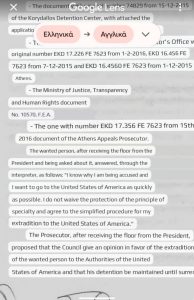
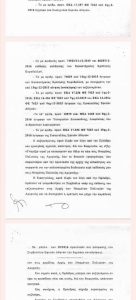
![]()
Rami Ghanem’s case paints a harrowing picture of the lack of medical care afforded to individuals while in Federal custody. Reports and Court documents suggest that Ghanem, during his incarceration, faced severe medical neglect, exacerbating his health conditions.

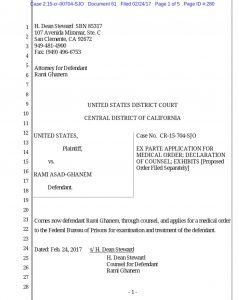

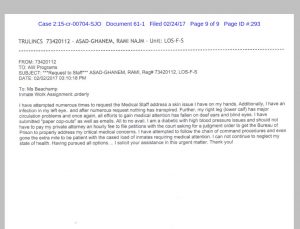
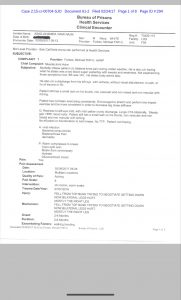

When an American citizen like Ghanem faced enormous hurdles in obtaining medical attention without a court’s intervention, one shudders to think of the potential plight of a foreign national within the same system, especially one grappling with mental disabilities (BPD), heart diseases like Wolf Parkinson-White (WPW), and the debilitating extreme heat of Florida prisons.



Such neglect, paired with the inherent challenges of navigating a foreign judicial Andrews correctional environment, can equate to a grim fate. It underscores a dire concern regarding the humane treatment of inmates, particularly those with serious medical and mental health conditions, in U.S. federal prisons.




4. **Interpol’s Troubling Role**:
The Interpol Red Notice, a crucial document in this saga, wasn’t even requested by someone from the judiciary. Instead, it comes from Janier Arellano, an individual without any apparent judicial authority or even a legal background.
In an intriguing revelation, Mr. Arellano does not appear to be listed as an attorney in the Florida Bar. Contrarily, both the prosecutor, Mr. Browne, and the Clerk of the Court, Angela E. Noble, are verified members and recognized attorneys within the Florida Bar. This raises questions about the roles and authenticity of the individuals involved in the case.

![]()

Throughout his stays and journeys, he transited through various airports without incident. Starting in Alicante, he flew to Milan, where he promptly rented a hotel room near the airport via Booking.com. The very next day, he continued his journey, flying from Milan to Zakynthos. During his stay on the island, he resided in a house he had secured through Booking.com, and throughout this period, no one approached or arrested him. Yet, when he attempted to depart for Romania from Zakynthos airport, he was unexpectedly detained based on an Interpol Red Notice. The workings of Interpol are not fully transparent to most, but such an event prompts queries. One can’t help but wonder if it’s a tactic by the US to effectuate Interpol arrests in countries they deem “more cooperative”.
Regarding Interpol, as a renowned international police organization, it raises substantial questions about their protocols and discretion. How can a globally recognized law enforcement body accept orders to arrest from a mere clerk rather than a judicial authority? Even more concerning is the acceptance of a warrant that bears a potentially forged signature, especially when such a crucial document lacks the endorsement of a judge. These discrepancies challenge the integrity and credibility of Interpol’s processes and actions, raising concerns about their commitment to due diligence in upholding justice. Moreover, in light of these troubling irregularities, it’s imperative that the Commission for the Control of INTERPOL’s Files (CCF) thoroughly investigates this Red Notice. Their mandate is to ensure that Interpol’s operations are in conformity with the principles of human rights and due process. Addressing this situation would not only uphold the credibility and integrity of the organization but also re-establish the trust of the international community in its operations.
5. **Inconsistent Financial Accusations**:
The beleaguered man struggles to comprehend the financial allegations. Varied documents including indictments, arrest warrants, and Interpol notices present different and confounding amounts.
![]()
![]()


![]()
The gaps and discrepancies in the U.S.’s narrative are not just minor clerical errors but fundamental inconsistencies that undermine the credibility of the entire case. Startlingly, in the indictment, he’s charged with 21 crimes, all of which, by the time of the indictment, are time-barred according to the statute of limitations. Yet, these accusations find no mention of the financial magnitude related to these crimes. The three specific amounts mentioned – $17,979, $19,988, and $13,979 – when combined, are a far cry from the staggering sum of $58 million dollars cited in the Interpol notice, agents’ testimonies, prosecutorial statements, and the figures presented to the Greek courts. In a puzzling contradiction, U.S. prosecutor, Mr. Browne, asserts that the indictment is the definitive charging document. If that’s the case, then why do these millions, glaringly absent from the indictment, feature prominently in all other accompanying documents? The overarching narrative is riddled with such glaring inconsistencies, casting serious doubt on the integrity of the accusations.
“In the indictment, I am charged with amounts totaling less than $100,000 USD. Yet, in the Interpol Red Notice and the statements by the agents, I am accused of sums in the millions. This discrepancy raises the question: which document holds the accurate charge – the indictment, the agents’ statements, or the Red Notice?”
6. **Conflicting Penalties**:
The confusion intensifies when the “applicable penalties” sections of the arrest warrant attachments present different maximum penalties for the alleged crimes than what’s indicated in the arrest warrant itself. This glaring inconsistency raises even more questions about the precision and reliability of these documents.
![]()


A person who has been extradited to another country for prosecution can only be tried and punished in that country for the specific offenses for which extradition was granted, and not for any other offense committed prior to the extradition.
There have been instances where allegations arose suggesting that the U.S. violated the doctrine of specialty many times.
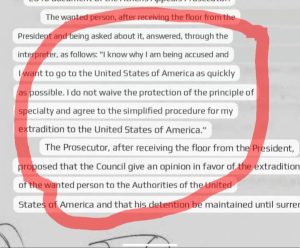
The case of Rami Ghanem, underscores the importance of adhering to the doctrine of specialty in extradition proceedings.
Rami Ghanem, an international arms dealer, was arrested in Greece following an undercover investigation by the U.S. Department of Homeland Security. After his extradition to the U.S., he was tried and subsequently convicted on charges that went beyond what was specified in his extradition request.
The very Rami Ghanem, cited by the U.S. as an example in the context of the arrest warrant procedure, is an emblematic case that raises serious concerns. Ghanem was denied essential medical treatment and experienced a breach of his rights. Furthermore, the violation of the extradition treaty in his case casts a shadow over the U.S.’s adherence to international agreements. Despite these significant transgressions, Ghanem’s situation is being presented as a suitable precedent for extradition proceedings. Such inconsistencies and perceived injustices warrant thorough scrutiny and challenge the credibility of using his case as a benchmark for others.

7. **Breach of Legal Norms**:
In an apparent breach of established legal procedure, answers to queries from the Greek Courts came directly from the Justice Department or IRS special agents rather than from a judicial authority or the prosecuting entity. This contravenes the standard post-indictment protocol stipulated by international extradition agreements, which specify that only the presiding court or the prosecutor assigned to the case should respond to foreign court inquiries.
![]()

Pursuant to extradition treaties and principles of international law, once an indictment has been rendered, it is solely within the purview of the court or the designated prosecutor to address any related matters. Communications pertaining to case details, especially concerning extradition requests, must emanate from either the presiding judge or the appointed prosecutor. Any other intervention is inconsistent with the principle of judicial independence enshrined in international legal standards.
It is an absolute travesty, a betrayal of the very principles that underpin our civilized society, that an European citizen could be forcibly uprooted, arrested, and extradited based on the mere whims of a single agent’s testimony, Agent Faraz Iman – a testimony that, when subjected to the light of scrutiny, disintegrates into sheer opinion. How have we come to this precipice where one individual’s unsubstantiated view can outweigh the bedrock of hard evidence, tearing apart the life of an individual who is entitled to the sacred rights of justice, fairness, and due process? The urgency with which we must address this miscarriage of justice cannot be overstated. The integrity of our legal system, the very soul of our democratic values, hangs in the balance. We must passionately rally against such blatant disregard for the principles that bind our society, lest we find ourselves tumbling into a chasm of judicial chaos and inequity.
8. **Hasty Indictment**:
An indictment issued just days before the expiry of the statute of limitations points towards a precipitated move to prosecution. This hurried approach becomes even more evident when we consider Agent Iman’s testimony before the grand jury, which gives off a rehearsed aura. Intriguingly, during the proceedings, Agent Iman responded to over 120 questions with ‘yes’ or affirmative answers, many of which were leading questions from the prosecutor, Mr. Browne, where the answer was embedded within the question itself. It’s remarkable that throughout this process, not a single question was posed by the jurors, which raises further suspicions regarding the solidity of the case’s foundation.

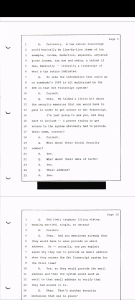
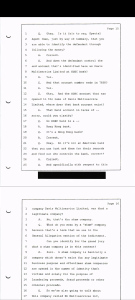
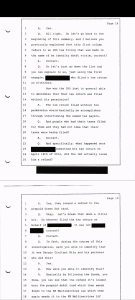
It’s peculiar and raises concerns when considering that during the grand jury testimony, jurors already had a copy of the indictment in front of them. This is contradictory to standard procedure, as the indictment is typically issued after the grand jury proceedings based on their findings. Having the indictment prior suggests a premeditated outcome, undermining the authenticity and integrity of the process.
Traditionally, the grand jury’s role is to decide whether there’s enough evidence to issue an indictment, not to review an already-prepared indictment.
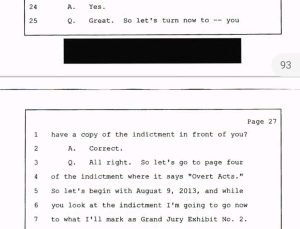
While the IRS did not officially assign blame to any specific group initially, later reports, including statements from lawmakers and third-party cybersecurity firms, pointed to the involvement of Russian cyber-criminals. It was suggested that the breach was part of a larger scheme by Russian organized crime groups to commit identity theft and tax fraud.


Compellingly, as the accumulated evidence suggests, the U.S. had access to the Senate Hearing, testimony of Michael Kasper, alongside expert reports or US Police Investigations pointing towards Russia, US & Nigeria. They also possessed information about the Russian co-conspirator’s computers, the involved companies, and bank accounts, all dating back to 2014-2016. Mr. Kasper explicitly stated under oath during the Senate hearing that he is among the 13,000 victims identified by the IRS at that juncture. Following his investigation, his IRS tax refund was directed to US bank accounts within the country, controlled by US citizens which had ties to Nigerians.
Isn’t it intriguing to ponder whether Senator Ron Johnson, the former Commissioner John Andrew Koskinen, or even the current Commissioner Daniel I. Werfel are privy to the irregularities marring this investigation? One has to wonder, are they content with such a dubious indictment? Do the potentially misleading statements from IRS agents sit well with their sense of justice and duty? In the vast corridors of power, who really knows, and who’s merely turning a blind eye?
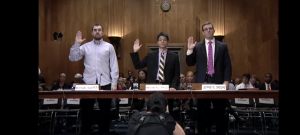

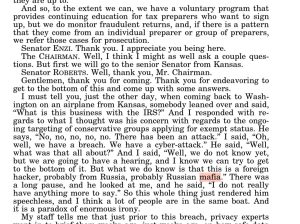

![]()
![]()
![]()

![]()

It’s quite astonishing to observe that, even after the bank account details and company documents came into the custody of U.S. authorities, the Russian hacker managed to siphon off substantial sums, ranging from hundreds of thousands to millions, from these accounts. Not only did he withdraw money after fleeing the U.S., but he also successfully transferred substantial amounts to various other foreign bank accounts. This raises a significant question about the diligence and oversight of the responsible authorities. How is it that a financial network, supposedly under strict surveillance, could be exploited to such an extent? And more pertinently, how do these authorities still retain their operational licenses and continue to function without a comprehensive review of their practices?



9. **Absence of Evidence**:
However, the absence of presentation of these pieces of evidence to the Greek courts and the defense team is a significant procedural concern. The defense could argue about the reliability and authenticity of this evidence if not made available for examination. Furthermore, if the same pieces of evidence are repeatedly presented for all the charging offenses, it raises questions about the specificity and uniqueness of evidence for each individual charge.

The audacity of the replacement of the alias “juliensweiss” with “GIULIANI NITA” in these documents raises serious concerns about the credibility and integrity of the investigation. It is evident that a script has been utilized to automatically make such replacements, an act that blatantly undermines the sanctity of legal proceedings. The superficial similarity in the names, as posited by the agent, verges on the absurd and is an insult to any discerning observer. Furthermore, it’s astonishing that the agent dared to present such a flimsy justification to the esteemed Greek judiciary, citing this as the only testimony when previously they have claimed to possess witness statements, bank records, and more. The introduction of a new statement bearing a questionable “fake signature” only adds to the growing list of inconsistencies and blatant oversights.
This is despite having lived in a humble 14m² apartment in Madrid as mentioned in the arrest warrant,
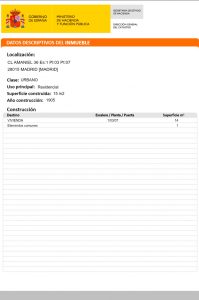

and renting an €400/month, 62m² apartment in Alicante, Spain

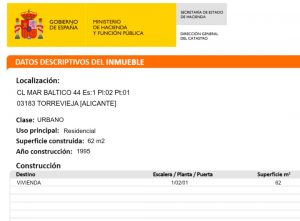
from someone having @.RU e-mail addressees —neither act proving any millionaire or hacker status.
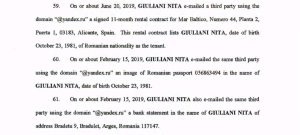
The ambiguity in the presented evidence is rather striking. While the U.S. has emphasized NITA’s residence in Liège, it assumes that any related online activity stems directly from this location. However, why would someone allegedly owning a botnet use their home IP address for illicit activities? It’s a foundational principle in digital investigations that an IP address alone doesn’t conclusively identify a suspect. According to established laws, the first step is to ascertain the device from which the suspicious activity originated. Relying solely on an IP address to pinpoint a person raises the pivotal question: how can there be such an oversight in associating online activity to an individual without concrete device verification?
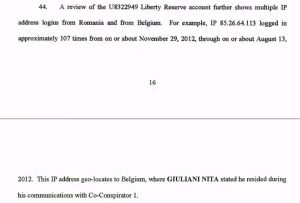

The The assertion made by the U.S. about the U8322949 Liberty Reserve account transferring approximately $2,700 USD directly to an HSBC Hong Kong bank account is fundamentally misleading. Liberty Reserve (LR) operated as a digital currency platform, where users could send and receive payments in the form of its proprietary ‘LR’ currency. However, it’s crucial to note that direct transfers from a Liberty Reserve account to a traditional bank account, such as HSBC Hong Kong, were NOT inherently facilitated by the Liberty Reserve system. Instead, transactions within Liberty Reserve were confined to transfers between LR accounts. against him is marred by contradictions and glaring omissions that are deeply troubling.
The U.S. claims he was actively sending and receiving various emails, yet astonishingly, none of these emails conclusively identify him as “juliensweiss.”
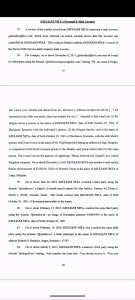
The wire transfer was “sent from Dawis Multi Service.” The text does not explicitly state who initiated or authorized the transfer, only that he communicated about it. This statement shouldn’t be misconstrued as “I have sent from Dawis.”
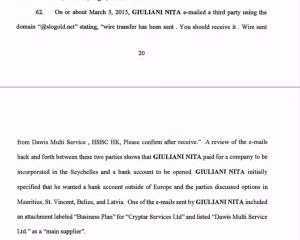
The agents’ handling of the evidence appears to be tainted by a predisposed narrative, seeking to associate him with the crime in a particular manner. Rather than following where the evidence naturally leads, they seem to have misinterpreted or selectively highlighted details to fit a preconceived storyline. Such practices compromise the integrity of the investigation, potentially leading to unjust conclusions and misrepresentations of the involved parties.
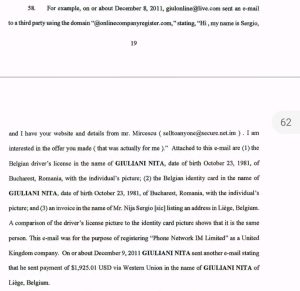

The claims made by the U.S. appear to have questionable logic. If someone controls a bank account or a company, they would already be privy to fundamental information such as bank account numbers, addresses, and SWIFT codes, as these details are essential for day-to-day transactions. It seems counterintuitive for someone to email themselves such basic information that they should already possess, especially if they are in control of the said accounts. Given the context, the act of saving bank details in an email seems more indicative of an outsider’s actions, rather than someone who purportedly owns or controls the account in question. The investigative conclusion drawn by the agents, in this case, lacks logical coherence and should be scrutinized further for a more accurate understanding of the situation.

They assert he founded companies in 2011, yet there’s no trace of any company registered in his name in the UK or Hong Kong in or around 2011. Bafflingly, while the U.S. states that they cannot obtain transaction logs from HSBC on the grounds that it’s a foreign entity, “they seem to have no qualms about requesting the extradition of an EU citizen.” When it comes to interviewing U.S. citizens who are owners of the so-called sham companies, they are proactive. However, they neglect to apply the Mutual Legal Assistance treaty for an EU citizen, revealing a stark double standard. And amid all their allegations and investigations, the U.S. fails to furnish, or even seemingly request, critical SWIFT logs detailing transactions related to the scrutinized accounts in Hong Kong. The landscape of evidence, or rather the lack thereof, paints a deeply disconcerting picture.
Two contrasting statements from U.S. agents have further muddled the waters. During the Grand Jury proceedings, Agent Iman stated that HSBC is a foreign bank, and thus, they couldn’t request its bank statements. In stark contrast, Mr. Failing, representing the IRS, informed the Greek Courts that, according to HSBC logs, a bank account associated with his name in Singapore received $2,000 USD sometime in 2014. This leaves us grappling with a critical question: Whom should we believe, Agent Iman or Agent Failing? Could such discrepancies be the real reason behind their insistence on secrecy?
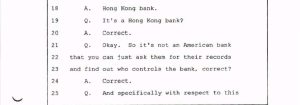
![]()
Discrepancies in dates further complicate the case. For instance, it was reported to the jury that the electronic devices of the Russian co-conspirator were seized in 2014. They claim to possess logs from these specific devices dating back to 2015. Such inconsistencies not only raise questions about the accuracy and credibility of the investigative process but also cast shadows on the integrity of the evidence presented.
How is it that they seem to have a crystal ball into the future, yet remain blind to the unfolding realities?
![]()

The omission of key details can sometimes alter the perception of an entire case. As per breachdirectory.org, the email address mentioned in the indictment was reportedly for sale on hacker forums, darknet platforms, and other underground marketplaces. Yet, this crucial piece of information seems to have been conveniently overlooked or omitted from official statements. Such omissions raise questions about the thoroughness of the investigation and whether certain aspects were intentionally disregarded to fit a particular narrative.

The posts penned by “juliensweiss” reveal a nuanced understanding of complex technical concepts related to Linux operating systems and network configurations. For an individual like him, who is claimed to have only an elementary education and a learning disability, these writings starkly contrast the portrait painted of him.
In 2008 and later in 2010, juliensweiss showcased advanced expertise by successfully installing OpenVPN on a Motorola Q9h. His post reflects a deep understanding of VPN configurations, network routing, and security protocols, suggesting hands-on experience in VPN setup and network security. Alongside evident online records indicating high cybersecurity education, this post reinforces his proficiency in the field, highlighting both theoretical knowledge and practical application.
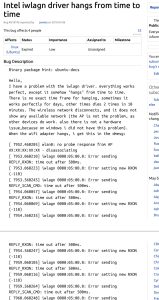
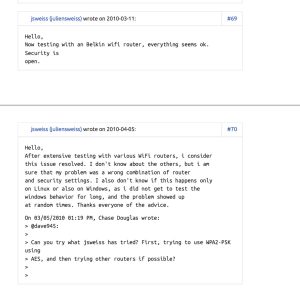


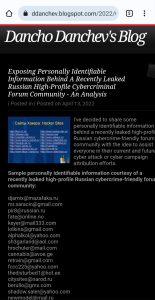

The posts authored by “giulonline” depict an individual seeking detailed information about starting a mixed farming enterprise in Romania, as inferred from the use of the term “coduri CAEN” (referring to NACE codes, a classification system used for economic activities in the European Union). He is keen to understand the regulations, advantages, and challenges of transitioning from personal farming to formalizing it as a business entity (such as an SRL or PFA) to access European funds. The individual expresses concerns about environmental licenses, specifically regarding waste management in semi-open farming systems, and emphasizes the importance of maintaining ecological practices. He mentions owning a variety of animals and practicing semi-open farming over an expansive area.The posts resonate with genuine inquiries of someone attempting to navigate the maze of formalizing a farming business and looking to expand and avail the benefits of European Union funds. The concerns raised, especially about environmental standards, exhibit a responsible and diligent approach towards farming.

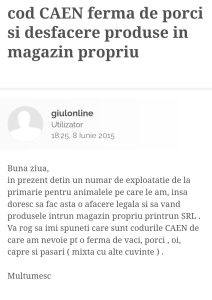
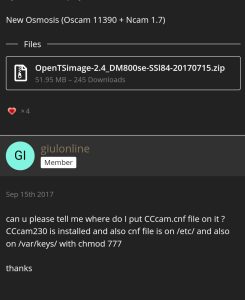
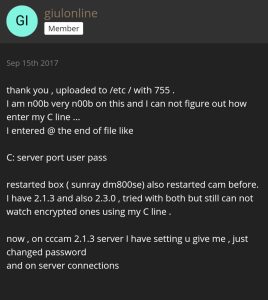
Considering that Giuliani was registered as a mentally disabled individual and received a state pension up until 2006, it raises questions about the plausibility of such a person acquiring advanced network configuration skills or in-depth technical knowledge just two years later, in 2008. The transition from the challenges associated with a mental disability to demonstrating high-level expertise in a specialized domain in such a short span seems improbable and warrants closer examination.
Giulonline and Juliensweiss present two distinct online personas based on the information provided:(chatGPT):
Let’s break down the posts of both giulonline and juliensweiss:
### **Giulonline:**
**Approach:**
– Giulonline’s posts are in the form of queries and follow-ups about specific concerns, predominantly about animal farming and technology settings related to the CCcam.cnf file.
**Writing Style & Tone:**
– **Informal and Conversational:** Uses colloquial phrases like “n00b” and expressions like “:frantic:” which give the sense of an informal online forum conversation.
– **Inquisitive:** Many of his posts pose questions, indicating a seek for advice or further information.
– **Appreciative:** Often thanks respondents, showing gratitude.
**Grammar:**
– **Fragmented Sentences:** Some of Giulonline’s sentences aren’t complete or are fragmented. This adds to the casual nature of the posts.
– **Punctuation:** There are occasional lapses in punctuation, such as missing periods at the end of sentences.
### **Juliensweiss:**
**Approach:**
– Juliensweiss appears to be seeking solutions to specific technical problems. These problems range from server configurations to issues with the iwlagn driver.
**Writing Style & Tone:**
– **Technical and Descriptive:** Juliensweiss often includes technical details in the queries, suggesting a more technical background or at least a comfort with technical jargon.
– **Problem-Solution Structure:** Posts generally describe a problem and then ask for or provide a solution.
– **Polite and Formal:** Compared to Giulonline, Juliensweiss seems to maintain a more formal tone, albeit still within the realm of forum-based conversations.
**Grammar:**
– **Structured Sentences:** The sentences are generally more structured and complete than those of Giulonline.
– **Punctuation:** Juliensweiss tends to use punctuation more consistently.
### **Similarities:**
1. **Seeking Solutions:** Both users are generally looking for answers or solutions to specific issues they are facing.
2. **Forum-Based Writing:** Both display characteristics of forum-based writing: a mix of formality and informality, direct questions, and use of technical language specific to the forum’s topic.
### **Differences:**
1. **Subject Matter:** While Juliensweiss discusses technical configurations and issues, Giulonline’s posts range from animal farming to technological settings.
2. **Tone & Style:** Giulonline is more casual and uses colloquialisms, while Juliensweiss maintains a slightly more formal and descriptive style.
3. **Grammar & Sentence Structure:** Juliensweiss appears to have more structured sentences, while Giulonline often uses fragmented sentences.
In summary, while both users are seeking solutions on forums and share the typical approach of forum-based writing, they have distinct tones, styles, and focuses in their posts. Juliensweiss leans more towards the technical and formal, while Giulonline seems more casual and broad in topics.
In our case, it’s evident that the investigation was conducted with a remarkable lack of diligence and thoroughness. The agents in charge seemed to have approached their tasks with a preconceived narrative, bypassing essential protocols and overlooking critical pieces of evidence. Such carelessness not only undermines the integrity of the investigative process but also jeopardizes the pursuit of truth and justice. The victims and stakeholders deserve better than a hastily conducted probe, driven by biases or neglect. This careless investigation has cast a shadow over the entire case, raising questions about the credibility of the findings and the fairness of the procedures.
It’s questionable to generalize the experiences of approximately 100 interviewees to a population of around 17,000 suspected fraudulent filings. Making broad inferences based on a fraction of the affected group might raise concerns about the comprehensiveness and diligence of the investigation. While interviewing a sample of affected individuals is a common practice in many investigative and research contexts, the validity of such a method hinges on the randomness and representativeness of the sample. Relying on the experiences of just 100 individuals, who may or may not be representative of the entire 17,000, can be seen as a superficial approach to ascertaining the scope and nature of the identity theft claims. Proper investigation should involve a more extensive effort to ensure the veracity of claims and provide a clear picture of the extent of the alleged fraud.

There’s significant overlap in the evidence presented for each count. Does this indicate a redundancy or lack of unique evidence for each count?
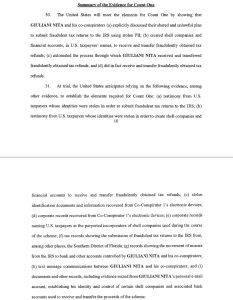
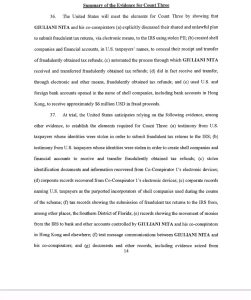
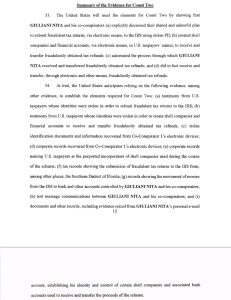
In the midst of a complex legal investigation, accuracy should be paramount. Yet, even with his passport in their possession, they continually misstate his name, referring to him as ‘Giuliani Nita’ when in fact his surname is ‘NITA’. This consistent oversight from various U.S. entities – the embassy, prosecutors, agents, and even the courts – raises unsettling questions. If they can’t get his name right, what other details might they be overlooking or misinterpreting? Such glaring inaccuracies amidst robotic prosecution serve as a stark reminder that without careful, human consideration, true justice remains elusive.


At the moment of his apprehension, not a single computer or storage device was found in his possession, casting serious doubts on the accusations leveled against him. Moreover, there were no house searches conducted either before or after his arrest, a significant oversight given the gravity of the charges. Strikingly, no rogatory commission, as stipulated by the US-EU Mutual Legal Assistance agreement, was established for this investigation, raising further concerns about the legitimacy of the entire process.
In the current scenario, the prosecutorial tactic of ‘putting the suspect behind the computer’ seems premature and oversimplified. While digital evidence might suggest a connection, it’s crucial to reconcile this with physical evidence and real-world alibis. According to the defendant’s Facebook check-ins, he was traveling, at bat’s with statuses indicating inebriation, or even at his farm in Romania, immersed in the wilderness during some of the purported online activities. These alibis present stark contrasts to the image of a person orchestrating complex digital operations. In our rush to find answers and assign blame in the digital sphere, it’s essential that we do not overlook the tangible, real-world situations that might provide a clearer picture of the truth.


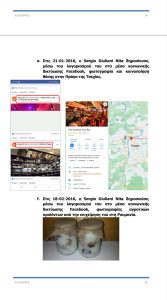



The photographs being used against him were conveniently extracted from his email, which contained his identity documents sent solely for the purpose of renting an apartment in Alicante in 2019 while the prosecution claims he opened companies in Hong Kong, back in 2012. The utilization of these photos, out of the context in which they were provided, indicates a potential misuse and manipulation of personal data to build a seemingly incriminating narrative. No e-mail search warrant was presented to the Greek Courts.
![]()
After extensive research through online sources and court documents, a puzzling pattern emerges: numerous individuals are indicted for strikingly similar offenses, each relating to the same cyber incident. Even more baffling is the observation that if one aggregates the amounts mentioned in all these indictments, the resulting sum exceeds the reported loss from the fraud or the sum total of victims’ losses. How is it feasible for a plethora of unrelated individuals to be charged for identical acts? This glaring inconsistency raises grave concerns about the precision and integrity of these charges. It demands an explanation: are the authorities casting too wide a net, or is there a lack of rigorous examination in determining the individuals responsible?
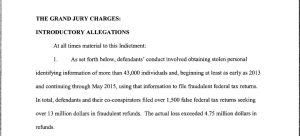
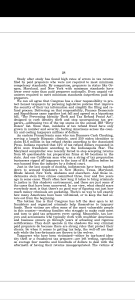
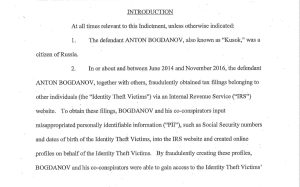



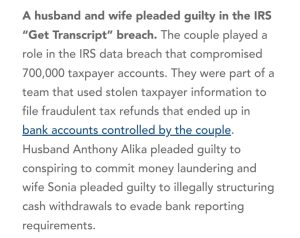


10. **Ignored Health Issues**:
The situation grows increasingly dire when reflecting on Giuliani’s mental health struggles. Having been diagnosed with multiple disorders, and once being on a disability pension — to the extent of being deemed unfit for military service because of his mental condition — it’s disheartening to learn that his repeated requests for psychiatric assistance were dismissed by the court. Furthermore, his attempts to seek support from the Romanian embassy proved futile, leaving him isolated and without the vital assistance he so urgently needed.

![]()
![]()
![]()
![]()
![]()

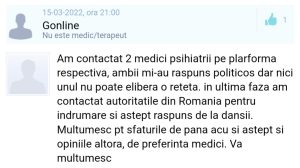
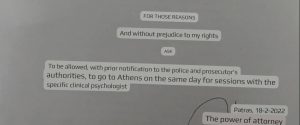
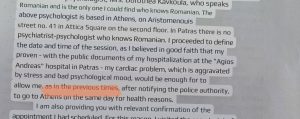
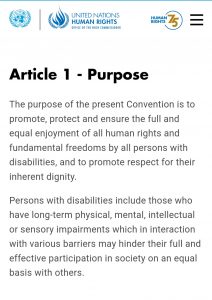
The purpose of the CRPD (Convention on the Rights of Persons with Disabilities) is to promote, protect, and ensure the full and equal enjoyment of all human rights and fundamental freedoms by all persons with disabilities, and to promote respect for their inherent dignity. It addresses both the rights and well-being of persons with disabilities, emphasizing non-discrimination, full participation, and equal opportunities in all aspects of life.
According to the Convention on the Rights of Persons with Disabilities (CRPD), persons with disabilities include:
“those who have long-term physical, mental, intellectual or sensory impairments which in interaction with various barriers may hinder their full and effective participation in society on an equal basis with others.”
The Convention on the Rights of Persons with Disabilities (CRPD) has been signed and ratified by many countries worldwide, including Greece, Romania, and the USA.
- Greece:
- Signed the CRPD on March 30, 2007.
- Ratified the CRPD on May 31, 2012.
- Romania:
- Signed the CRPD on January 26, 2007.
- Ratified the CRPD on December 31, 2010.
- USA:
- Signed the CRPD on July 30, 2009.
- However, the USA has not ratified the CRPD. The U.S. Senate considered the convention in December 2012 and again in July 2014, but it did not garner the two-thirds majority required for ratification on both occasions.
It’s important to note that while signing the convention indicates a country’s intention to take steps toward ratification, ratification legally binds the country to the provisions of the treaty. In the case of the USA, while it has signed the CRPD, it is NOT legally bound by it since it has NOT ratified the convention.
The medical documents submitted to the court regarding his mental health concerns are not recent, as they reflect a longstanding history of mental health issues that predate his arrest. Contrary to any assumptions that the accused developed mental health problems post-arrest, it is crucial to acknowledge that the individual has been grappling with these challenges for over two decades. These documented disabilities have been a consistent part of the accused’s life, with their existence dating back more than twenty years. It’s important to note that while the defendant might not be reliant on disability pension, their mental health is actively managed through treatment. It’s a misconception to view mental health conditions as having a “cure” akin to some physical ailments; rather, they are treated over time to improve the individual’s well-being and quality of life.
11. **Character Misrepresentation**:
This man, with just eight years of primary education, no known programming skills, no US visa, no linguistic proficiency in Russian, no Belgian passport, and no connections to Poland (contrary to claims of a Polish girlfriend), stands accused of sophisticated cybercrimes. He has always been transparent about his whereabouts, always traveled under his own name, and has remained consistent in his appearance for two decades.

As IT experts affirm and alibis from social media accounts corroborate, no trace exists of the alleged juliensweiss identity.
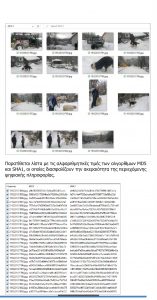
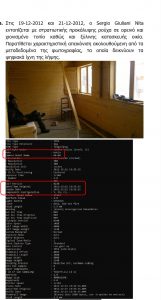


Despite an extensive trial process lasting nearly two years, the First Court of Appeal in Patras meticulously evaluated the case. Throughout numerous sessions, the court carefully considered testimonies regarding his character, whereabouts, and activities during the alleged crime periods. They sought clarifications from the U.S. concerning the arrest warrant and rigorously requested any evidence implicating the defendant. Given the brusque, questionable, and procedurally irregular responses from the American side, the Patras court found ample reason to rule against extradition.
Yet, shockingly, the Greek Supreme Court appeared to dismiss the diligent efforts and findings of the Patras Court. It disconcertingly overturned this decision in a mere two-hour session, culminating in a resolution to extradite him to the U.S. This hasty verdict might condemn him to up to 45 years of incarceration – essentially a life sentence considering his age. The Supreme Court’s disregard for the accused’s status as a disabled individual, blatantly ignoring the disability certificates and details about his medical conditions, is a matter of grave concern.
What’s more, the Supreme Court seemed unprepared and uninformed at the trial’s onset. Initially, they were under the erroneous impression that the defendant was appealing the Patras court’s decision. It was only after the “interrogation” of the defendant and the IT expert, that they came to realize their mistake. The court inexplicably questioned why the defendant hadn’t left Greece, failing to understand that fleeing would restart the entire extradition process in a different jurisdiction.
Notably, they overlooked compelling testimonies from esteemed IT experts. Among them is Mr. George A. Karathanasis, a distinguished IT judicial professor at the National School of Judicial Officers in Electronic Document Management. He is also registered in the Panels of Experts of the Greek Courts. Mr. Karathanasis was questioned by the court. In addition, the court was presented with written reports from Nikos Vasilakos, who is recognized as a “Tinkerer, Growth hacker, Tech journalist, Developer, Linguist, Dad, and a Tech news TV & radio show Presenter.”
These professionals had vouched for the defendant’s alibis during the crime periods. The graphologist’s reports, witness statements, and even a testimony from a former Romanian Mayor confirming the accused’s involvement in farming between 2013-2016 were conveniently overlooked.

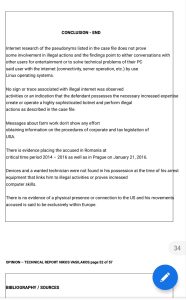
Disturbingly, the Supreme Court exhibited a blatant disregard for upholding the defendant’s rights, sidelining him from a process that critically impacts his future. The court’s oversight extended to neglecting crucial aspects of the case: they turned a blind eye to the violations of the extradition treaty and the specialty doctrine in the Ghanem example provided by the U.S. Moreover, they chose to sidestep the vital step of consulting the European Court of Justice about the “issuing judicial authority” involved in the warrant.
Perhaps most alarmingly, the court seemingly dismissed the defendant’s status as a mentally disabled individual, refusing to factor in the unique considerations that such a situation warrants. Furthermore, even when confronted with concrete data and reports concerning U.S. prison conditions, the court refrained from seeking further details, effectively sidelining concerns about the defendant’s prospective incarceration conditions.
The overt deference of the Greek prosecutors to American legal mandates, at the expense of adhering to foundational European and Greek tenets, is not just worrisome, but bordering on betrayal. To watch the Greek judicial system, historically rooted in strong democratic values, seemingly capitulate to American demands is a disheartening spectacle. It’s tantamount to a dereliction of their sworn duties, as if the scales of justice have been unfairly tipped towards foreign interests. To advocate for, or even indirectly suggest, that the courts disregard pivotal decisions from bodies such as the ECHR or ECJ is akin to forsaking Greece’s rich legal heritage. Such actions not only undermine the sanctity of European legal principles but are also reminiscent of acts of treason, where allegiance appears to have been shifted from one’s homeland to a foreign power.
The question that arises then is: Whose interests are these prosecutors truly serving?
Honorable Judge Robert N. Scola, Jr. of Florida, assigned to preside over the case since March 2021, appears to have been remarkably sidestepped throughout the entirety of the extradition proceedings. It’s puzzling and deeply concerning that none of the documents relayed to the Greek authorities exhibit his signature or official endorsement. This glaring omission, combined with the fact that various other judges have been inexplicably called upon to validate agents’ testimonies, undermines the very essence of procedural consistency and transparency. Even more perplexing is the fact that despite direct inquiries made to the Florida court, responses continually circumvented Judge Scola, with agents testifying before alternate judiciaries. Such a deviation from standard legal protocol, where testimonies should be presented before the case’s assigned judge, further intensifies the cloud of suspicion. The systematic exclusion of Judge Scola from these crucial stages of the extradition proceedings not only breaches conventional legal practice but also casts significant doubt on the credibility and motivations of those orchestrating these actions.
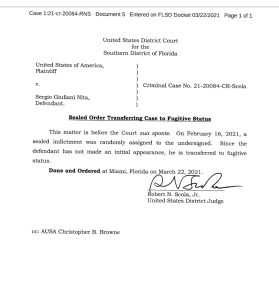
The issuance of a “fugitive status” for an EU citizen without prior notification or citation raises pressing concerns about due process and fundamental rights. The term “fugitive” traditionally connotes someone who is actively evading the law after having knowledge of legal proceedings against them. Yet, in this scenario, the defendant, who is an EU citizen and outside the jurisdiction of U.S. courts, was labelled a fugitive without having been made aware of the indictment or being provided any opportunity to present themselves before the court. The act of categorizing someone as a fugitive under these circumstances not only has profound implications for their legal status but also poses severe reputational risks. Moreover, for an international case of such gravity, the adherence to proper notification procedures, especially when dealing with foreign nationals, is paramount to maintain the integrity and fairness of the judicial system. This raises legitimate questions about the procedural fairness and the foundational principles that underlie the justice system.
Was he provided with legal representation or informed of his rights when any evidence was being collected against him?
Yet, one wonders, why has this individual never been questioned about these crimes? His whereabouts and identity remained consistent, his disabilities documented, and his life an open book. Moreover, his phone number was even listed in the arrest warrant, suggesting he could have been easily located and contacted, with or without his knowledge.
The arguments against the identity of ‘juliensweiss’ pile up. A mere 8 years of primary education, no programming skills and no hacking prowess, paint a picture of innocence. Key alibis can be traced back to social media activity during the time in question.
This leap in capabilities within a short span raises questions. Moreover, the assertion that someone with such a background could be a principal actor in a major IRS breach — a feat necessitating profound technical acumen — seems statistically improbable.
Every claim he presents forms a tragic testament: from the lack of advanced education to the absence of hacking prowess, from never having set foot on American soil to not speaking a word of Russian. The poignancy of his situation is accentuated by the stark contrast of alleged millionaire crimes and a humble 14m² dwelling.
Imagine the weight of such accusations, the soul-crushing burden of defending oneself against a tidal wave of unfounded claims.
Piercing through the evidence, this desperate plea resonates:
“I have never been to the US.
I have never owned or controlled any company in Hong Kong or USA.
I don’t speak Russian.
I don’t own a Belgian passport,
I’ve never had a Polish girlfriend.
I’m not a hacker!
I’m not juliensweiss!
Why am I being accused?”
**Cries for Intervention**:
“I appeal to the ombudsmen of the EU, Greece, and Romania, the foreign ministers of Romania, Greece, the EU, and the USA, and the justice ministers of Romania, Greece, the US, and the EU. I also reach out to the European Commission, Commission for the Control of INTERPOL’s Files (CCF), and urge them to actively engage in my case and thoroughly review all related case files. Additionally, I request the European Court of Justice and the European Court of Human Rights to scrutinize the decisions made by Greece and the extradition request by the US, including the responses provided to Greek Courts by the US. I call on the media and NGOs to champion this cause. While the US seeks confidentiality, we demand transparency!”
This chilling account brings forth one pressing question—Is this a simple case of mistaken identity or a larger, more sinister plot? The time has come for clarity, transparency, and the delivery of justice.
Shouldn’t the state offer a helping hand through treatment, rather than the cold confines of prison bars, to those struggling with mental illness?
“I extend my deepest gratitude firstly to my unwavering wife, whose support has been a beacon of hope in the darkest of times. I am eternally grateful for the undying love and patience of my family and friends who have stood by my side throughout this tumultuous journey. A special word of appreciation goes out to attorney Andreas Regklis, who has been involved with my case from the very beginning. More than just an attorney, he has been a true friend and the foundation of my defense. I’m profoundly thankful to the dedication and hard work of attorneys Zoe Konstantopoulou, Professor Ilias Anagnostopoulos, Alexandros Tsagkalidis, and Kavvada Iliana Andromachi. My sincere appreciation also goes to Mariana Craciun, the Romanian consul in Patras, for her invaluable guidance, and to psychologist Dorothea Kafkoula, whose counsel has been a constant source of strength during these challenging times.”
#IamNOTjuliensweiss
Documents:
English:
Extradition Request – Prosecutor Browne
Extradition Request – IRS Agent Failing
Extradition Request – Arrest Warrant
Grand Jury Testimony -IRS Agent Iman
DOJ answer – Arrest WarrantWarrant
Agent Failing – Answer – Additional Evidences
Nikos Vasilakos – IT expert reportreport
Spanish apartment official cadastral data
Spanish apartment 1 official cadastral data
Embassy Note 1
Embassy Note 2
Romana:
Raspuns DOJ referitor la mandatul de arestare si Ghanem.
Raspuns Agent IRS referitor la dovezi
Decizie Curtea de Apel din Patra
Memorandul explicativ catre Curtea Suprema
Cadastru apartment Spania din mandat
Cadastru apartment Spania 1 din mandat
Ελληνικά:
Απάντηση DOJ – Ένταλμα σύλληψης
Αποφάσεις του Αρείου Πάγου και κίνητρα
Απόφαση του Ελληνικού Ανώτατου Δικαστηρίου
Γεώργιος Α. Καραθανάσης κανω ΑΝΑΦΟΡΑ
Ισπανικό διαμέρισμα επίσημο κτηματολόγιο
Ισπανικό διαμέρισμα επίσημο κτηματολόγιο 1
Patra Court Psychologist request denied
Disability Certificate submitted to Patra Court
Attorney Andreas Regklis statement Patra Court
While many of the documents are provided in both Romanian and English, some encompass Greek, it’s important to note that certain documents might be available in only one of these languages.
Videos:

